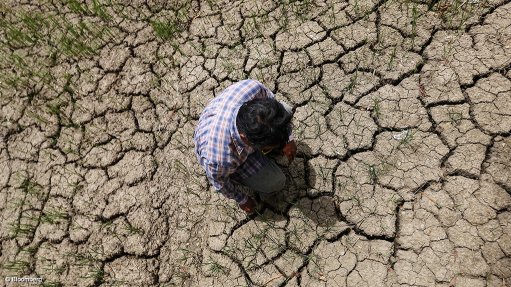
Photo by: Bloomberg
Reiterating that the drought is likely to cost South Africa billions in trade losses, as well as result in a 42% decrease in national agricultural production, Western Cape Economic Opportunities Minister Alan Winde has made dealing with the impact of the drought his “foremost priority”.
Agriculture, Forestry and Fisheries Minister Senzeni Zokwana last Friday confirmed that South Africa might have to import up to six-million tons of maize this year owing to the drought.
Speaking ahead of his participation, on Friday, in a Minister and MEC meeting with Zokwana and other provincial MECs, during which he would table a report on the impact of the drought on the Western Cape, Winde noted that the drop in agricultural production had resulted in a 1.1% decrease in the country’s gross domestic product.
He added that consumers would start feeling the effects of the drought, as food prices would increase.
“Dealing with the impact of the drought is my foremost priority, which is why, in December, I approved an emergency support package for emerging farmers in our hardest-hit areas.
“A full assessment was completed and these beneficiaries have been identified. In line with the law, we have appealed to the national government for drought relief,” Winde stated.
Western Cape Disaster Management Centre head Colin Deiner added that the organisation was continuously monitoring the drought situation in the province, and holding regular integrated meetings with all relevant stakeholders, including the national disaster management centre and relevant national departments.
The main areas of concern, he advised, remained the three municipal areas of Witzenberg, Prins Albert and Oudtshoorn.
The West Coast and Central Karoo Districts also remained of some concern.
Winde, meanwhile, assured that the Western Cape government would continue to encourage smart agricultural practices to mitigate the impact of natural disasters.
“We have already introduced conservation agriculture. This approach is being driven by the Western Cape Department of Agriculture and the Agriculture Research Council. It involves minimum soil disturbance, maximum soil cover and crop rotation.
“Our wheat farmers have already seen increased production and profit and reduced soil erosion. Going forward, we will continue to raise awareness of this approach,” he said.
The Western Cape government had also partnered with the University of Cape Town and the provincial agricultural sector to develop a comprehensive climate change response plan.
This initiative, the SmartAgri project, was being driven jointly by the provincial departments of Agriculture, Environmental Affairs and Development Planning.